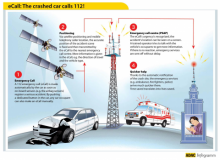
The EC had originally proposed that legislation for the introduction of the eCall system would be in place by end of 2015.
But adoption by the European Parliament has been slower than expected and so the deadline for implementation of the eCall system has slipped by two years to 2017/2018.
In case of a crash, an eCall-equipped car automatically calls the nearest emergency centre. Even if no passenger is able to speak, due to injuries, the exact location of the crash site is transmitted via a wireless link to the emergency services.
According to the EC, the system could reduce response times by 50% in the countryside and 60% in built-up areas.
There will also be the facility to activate the eCall by pushing a button inside the car. Witnessing an accident, you can thus report it and automatically give the precise location.
New BMW and Volvo cars have the eCall system fitted, but more general voluntary adoption has been slow.
The UK government is not in favour of mandatory introduction of eCall because of the extra cost to each vehicle. But it accepts the UK will not be able to opt out.
The system, estimated to cost around €100 per car, combines a satellite positioning receiver with a cellular data modem. A licence-free Qualcomm data protocol has been selected for the system.
As eCall normally ‘sleeps’, it does not allow vehicle tracking outside emergencies. This requires the system to run autonomously for long periods of time using only backup battery power, and requires low power electronic devices, but which are automotive qualified.
Texas Instruments has recently introduced its first automotive Class-D audio amplifier for emergency call (eCall) and instrument cluster systems.
The TAS5421-Q1 from TI integrates 40V load dump and over-temperature to protect against harsh automotive conditions, such as load dump, that can damage the Class-D amplifier.
There are also diagnostic functions via an I2C interface.
TI has also created a eCall reference design comprised of analogue AEC-Q100-qualified integrated circuits from TI.
The TAS5421-Q1 is available in a 16-pin HTSSOP package with PowerPAD package.
 Electronics Weekly Electronics Design & Components Tech News
Electronics Weekly Electronics Design & Components Tech News

